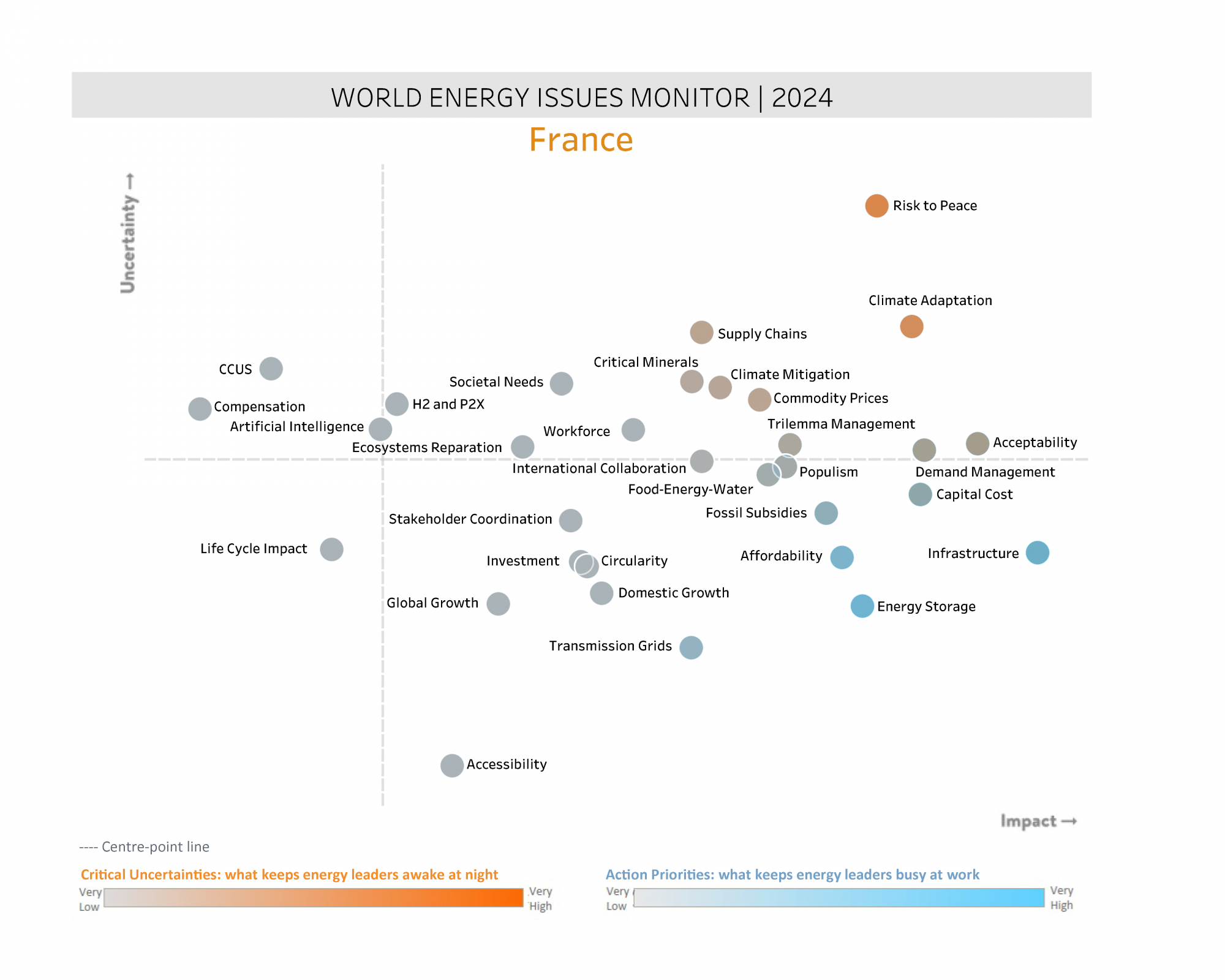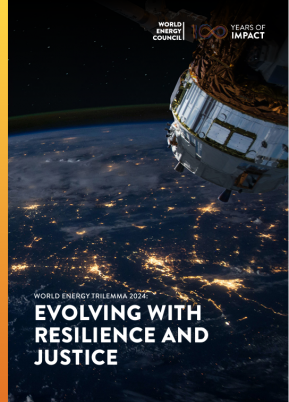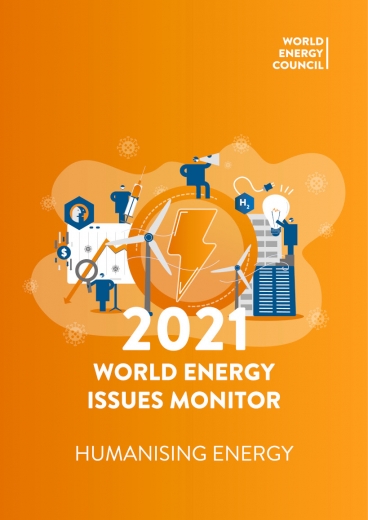The French Council of Energy is the World Energy Council French National Committee. Its members are leading French companies, organizations, institutions and associations with an interest in scientific, technical and industrial participation in global energy issues. It represents its members in all international activities of the World Energy Council, in particular during the preparation of the World Energy Congress. The Council considers all matters relating to the provision and use of sustainable energy useful to the activity of the World Energy Council, and monitors and promotes research related to these questions.
Jean-Bernard Lévy was appointed Chairman and Chief Executive Officer of EDF Group on November 26th, 2014.
From December 2012 to November 2014 he was the Chairman and Chief Executive Officer of Thales, a leading electronics and systems industrial group.
From 2002 to 2012, he was at Vivendi, a global communications and digital media company, based in Paris. He was Chief Operating Officer of Vivendi from 2002 to 2005, and CEO from 2005 to 2012.
From 1998 to 2002 he was Managing Partner, Corporate Finance at Oddo & Cie.
From 1995 to 1998 he was Chairman and CEO of Matra Communication.
Jean-Bernard Lévy was General Manager, Communications satellites of Matra Espace and then Matra Marconi Space from 1988 until 1993, when he became Chief of Staff to Gérard Longuet, the French Minister for Industry, Postal Services & Telecommunications and Foreign Trade.
From 1986 to 1988, he was Advisor to Gérard Longuet, the French Minister for Postal and Telecommunications Services.
Jean-Bernard Lévy began his career in 1979 with France Telecom as an engineer in Angers. In 1982, he became responsible for the management of senior staff and budgets, and was later promoted to deputy head of Human Resources.
Jean-Bernard Lévy, 62, is married with four children. He is a graduate of the École Polytechnique (1973) and Télécom ParisTech. He is an officer of the Légion d’Honneur and of the Ordre National du Mérite.
Marie-Line Vaiani is since January 2023 Secretary General of the Conseil Français de l’Energie, the French committee of the World Energy Council (WEC).
She has spent most of her career in the energy sector, covering a wide range of assignments in France and abroad: from multi-use water management of EDF's hydroelectric dams to the development of new dispatching systems for the Electricity Transmission Network operator, from local economic development and management of an investment fund with "Une rivière, un territoire" program to international development and diversification strategies, from the regulation and market design of energy markets to the development of a national industry for renewable energies, hydrogen, batteries.
An ENSTA Paris engineer, specialising in mathematical engineering, she holds a degree in corporate finance and capital markets from Sciences Po Paris and an executive MBA from HEC Paris.
She is Chevalier de la Légion d’Honneur.
Energy in France

This edition of the World Energy Issue Monitor 2024 highlights some perceptions that resonate with facts or actions undertaken in recent months.
According to Météo-France, 2022 was the hottest year ever recorded in France, and in mainland France, climate warming has already reached 1.7°C over the last decade compared to the period 1850-1900. The effects of climate change—extreme rainfall, heatwaves, droughts, forest fires—are already being felt throughout the country, and this will continue, highlighting the importance of climate adaptation.
A plan to accelerate ecological transition
In this context of climatic, meteorological, and environmental emergencies, France has developed a plan to accelerate the ecological transition. After a year of work involving all ministries, economic sectors, representatives of local authorities, think tanks, and environmental associations, France has drawn up a plan to tackle five environmental challenges:
•Mitigating climate change
•Adapting to the inevitable consequences of global warming
•Preserving and restoring biodiversity
•Preserving resources
•Reducing pollution affecting health
This ecological plan (Planification Ecologique), placed under the authority of the Prime Minister, is based on 20 projects with specific and quantified objectives and involves the whole of society. Its aim is to offer everyone—citizens, local authorities, companies, associations—a way of working together to reduce our footprint and to imagine a world that is liveable, fair, and desirable. A pathway where everyone finds their place and has the means, skills, and influence to take effective action.
The plan is based on the implementation of 55 actions to reduce emissions by around 200 MtCO2e between 2019 and 2030 across all sectors (energy, transport, industry, agriculture, buildings, carbon sinks). As early as 2023, there has been a noticeable acceleration in the reduction of CO2 emissions across all sectors.
National Energy and Climate Strategy
2023 has seen the launch of the government consultation on the new energy and climate strategy (Stratégie Française pour l’Energie et le Climat).
France’s choice, several decades ago, of electrical independence and nuclear power means that today 90% of electricity production is carbon-free and covers most of the national needs. In addition, over the last fifteen years, the country has made a major effort to develop renewable energies, and this development is set to extend to all energy carriers: biomethane, bioliquids, biomass, geothermal energy, renewable electricity, etc. However, the energy mix is still dominated by fossil fuels, with oil accounting for 37% and natural gas for 21% of final energy consumption.
The energy and climate strategy submitted for consultation by the government was based on three major challenges:
•REDUCING ENERGY CONSUMPTION BY 40 TO 50% BY 2050
•ENDING COAL-FIRED POWER GENERATION BY 2027 AND ENDING DEPENDENCE ON FOSSIL FUELS BY 2050
•INCREASING LOW CARBON ENERGY PRODUCTION (Electricity and low-carbon gas, heat, and fuel)
In the survey, the representation of French energy issues is particularly marked by the Ukrainian conflict, which appears as a common thread fuelling uncertainty and the assessment of potential impacts. Unsurprisingly, the risk to peace is the theme with the greatest uncertainty and one of the strongest impacts. This goes hand in hand with concerns about supply chains and energy security, given the remaining dependence on imports and the growing competition for control of technologies and supplies for the energy transition, whether in terms of strategic raw materials or key components for low-carbon energy technologies.
The uncertainty mentioned about demand management may encompass several aspects: 1) long-term uncertainty about the dynamic of evolving uses to achieve the demand reduction for fossil fuels; 2) a short-term question on the (still) low level of demand observed after the energy price crisis; or 3) the management of the flexibility of electricity demand to adapt to the development of a growing intermittent energy supply.
The considerable investment required to develop or adapt energy infrastructures (networks, production, storage) in the next decades raises questions about their acceptability and the time needed to obtain licenses and permits. This is a key challenge regarding the targets for increasing low-carbon domestic production. In 2023, two laws were thus promulgated in France: one to accelerate the production of renewable energies, and the other to accelerate the procedures linked to the construction of new nuclear power plant and the operation of existing nuclear power plant.
Among the priority actions in France is the availability of workforce and skills to successfully carry out the energy transition in all its components. A University of Nuclear Professions was thus set up to support the strong long-term need for recruitment in the sector, along with a Battery School and a Networks School for the energy transition.
An important point, which was not raised as such in the answers to the questionnaire, is energy equity and affordability for households and industry. This dimension occupies a significant part of the public debate in France and is undoubtedly essential to guarantee a fair and accepted energy transition.
The survey conducted in early 2024 already revealed several areas of concern, stemming in particular from the international context—firstly the Russian-Ukrainian conflict, and now the situation in the Middle East.
It seems likely that the level of uncertainty in 2024 will remain high.
Acknowledgments
France Member Committee
Downloads

France World Energy Trilemma Country Profile 2024
Download PDF
World Energy Trilemma 2024
Download PDF
France World Energy Issues Monitor 2024
Download PDF









